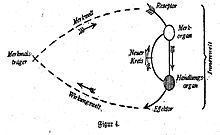Functional circle

The functional circle is a cybernetic thinking model from the field of behavioral research and goes back to the biologist and zoologist Jakob Johann von Uexküll (1864–1944). It includes the self-contained relationship between environmental properties ("characteristics") and the triggering of reactions (specific behavior or "effects") in animals.
example
A tick stings all objects that smell of butyric acid and have a temperature of 37 ° C, regardless of whether this object is also suitable for sucking blood.
meaning
The concept of the functional circuit represents an early cybernetic model that was set up as early as 1920 in the work "Theoretical Biology" by Jakob Johann von Uexküll. The theoretical biology relies today on Jakob von Uexküll as one of its founders.
Since behavioral research has also been successfully applied to humans, the model was transferred to psychophysical correlation . This represents a further development of the model developed by Jakob von Uexküll, because here higher centers of the nervous system were included in the control loop, see also the basic concept of the → subject in psychosomatics. The functional circle was used as an emergent model in psychosomatic medicine including psychoanalysis , see z. B. → functional syndromes .
See also
- Reflex arc as the simplest neuronal excitation circuit = control circuit on the vegetative level
- Psychophysical correlation = control loop on the animal level
- Situation circle = control loop on the human level (further development of the functional circle on the animal level)
- Biocybernetics
literature
- Johann Jakob von Uexküll: Worlds never seen . My friends' environments . Fischer, Berlin 1936.
- Wolfgang U. Eckart : Jakob von Uexküll. Functional circle. In: History, Theory and Ethics of Medicine. 8th edition, Springer, Heidelberg / Berlin / New York 2017, p. 316 f. doi : 10.1007 / 978-3-662-54660-4
proof
- ↑ Johann Jakob von Uexküll: Theoretical Biology . Published by Gebrüder Paetel, Berlin 1920.
- ↑ Functional circle . In: Uwe Henrik Peters : Dictionary of Psychiatry and Medical Psychology. 3. Edition. Urban & Schwarzenberg, Munich 1984, p. 203.
- ↑ Emergence and control loop. In: Thure von Uexküll u. a. (Ed.): Psychosomatic Medicine. 3. Edition. Urban & Schwarzenberg, Munich 1986, ISBN 3-541-08843-5 , p. 11 ff. (Chapter 1.3.2 The emergent properties of animal systems)
- ↑ Wolfgang Loch : On the theory, technology and therapy of psychoanalysis . S. Fischer Conditio humana (edited by Thure von Uexküll & Ilse Grubrich-Simitis ) 1972, ISBN 3-10-844801-3 ; P. 54 on district "Cybernetics".
